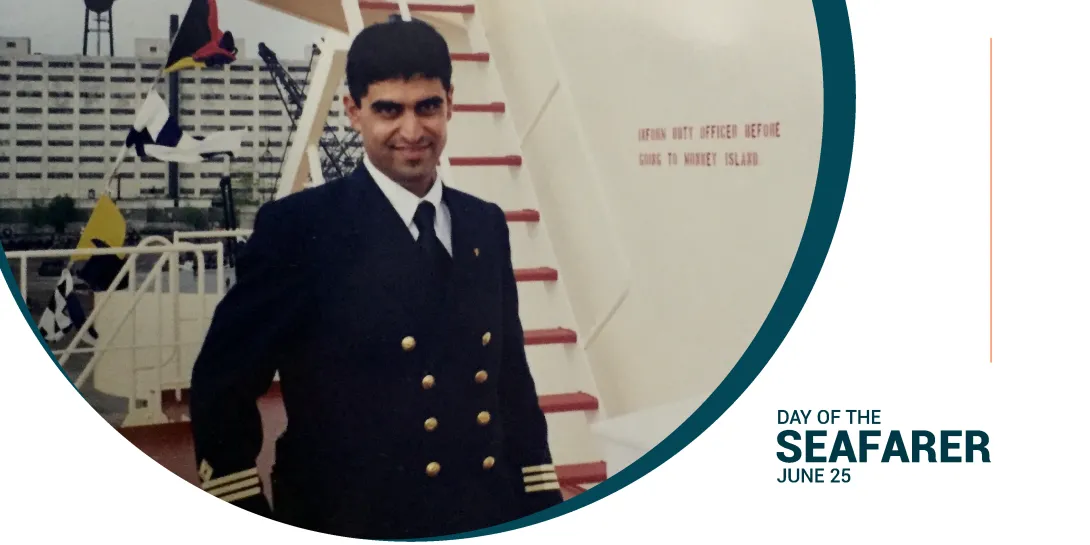In this article, RightShip Vetting Superintendent, Khushroo Vimadalal, reflects on his time at sea and the ways in which he empowered seafarers to have a voice.
I grew up in Mumbai, India. After my college graduation I was invited by my neighbour, who was a maritime professional, to spend a weekend on an oil drill support ship and eventually this led me to choosing a career at sea. As a cadet I worked for numerous shipping companies until 1996, when I joined a leading ship management company. I was there for 24 memorable years until I joined RightShip in 2020.
During my career, I moved up the ranks until I was a captain and then transitioned ashore in 2005. I’ve held several roles in the health safety, security, environmental sustainability and quality. I was lucky to have been mentored by some of the best professionals on board and ashore.
Looking back at 2020 and with all its trials and tribulations that we as a humanity have faced, it’s critical that we designate our seafarers as essential workers. Let’s take the example of the “Ever Given” vessel in the Suez Canal, the blockage caused vessels backed up in the Mediterranean to the north and the Red Sea to the south. It is estimated that the costs to global trade was about $400 million per hour based on the approximate value of goods that are moved through the Suez every day.
When a canal shuts down for a week oil prices go up, food prices go up, and shelves are not stocked. Our seafarers are responsible for essential global trade, so they must be treated well and respected for their work.
Improving conditions for seafarers and reducing stress
I believe we need to provide seafarers with more positive reinforcement. On any given day in port the crew deals with numerous authorities, inspections, charterers, owners and at the same time trying to maintain rest hours and a plethora of other rules and regulations.
For example, Port State Control inspections can be a source of stress. I have seen various scenarios where a captain wants to paint draught marks, but a harbour master says no because they do not want paint in the water (local regulations), or lightbulbs fused due to bad weather they encountered just prior to coming into port, but they have not been able to replace them because they have been at sea. The inability to do the work can lead to a deficiency from the Port State Control officers. I think we need to take a macro approach to vessel conditions and provide a better understanding of the challenges and limitations at sea.
More focus on individual wellbeing is also a priority. When I was at sea, sad news, like a death in a crew member’s family would come through the captain following which the master and his ship mates would take care of their fellow shipmate during this time. Now, with the internet, it is possible for seafarers to face a personal crisis and deal with it without anyone on board even knowing about it.
During my sailing days we used to meet every evening to watch a movie etc. This does not happen today. Seafarers will be in their cabins at end of the workday and the ship’s master does not necessarily know what’s happening with the crew. Solutions for crew social welfare are critical.
[Sub head] Communications and empowerment
In my experience, what gets appreciated gets repeated. This means when a crew feels valued and receive positive feedback, they will continue to do good work. I wish in every external inspection there should be a section to provide positive comments & applaud the good practices seen on board. The same can be done by an auditor or a PSC inspector.
When I was an auditor, I would dedicate 40 per cent of my time exclusively to talking to people; to coach them and discuss their experiences. I like to give everyone a voice and make them feel heard and appreciated. I was always learning from the seafarers because I gave them the opportunity and the confidence to speak up.
Empathy and cultural considerations are also valuable for the perception of safety. Safety has different meanings in various cultures. For example, in some countries, if you ride a motorbike, you must wear a helmet and in some countries, you see a father riding a bike with a child sitting on the gas tank and a new-born baby in the mother’s lap on the back seat. In these cases, how do you reinforce safe ways of working? You need to bring their level of understanding up by discussing with mutual respect rather than just lecturing them.
Progress in seafarer protection
To achieve long-term improvement, every person in a position of power should be talking about this a lot more and at every given opportunity collaborate with international and
industry organizations– from classification societies ( IACS) to the IMO
I wish more people in power would have spoken more about the importance of valuing our seafarers during Covid -19 situation and the recent incident in the Suez, which garnered a lot of media attention.
A lot more needs to be done to accentuate the importance of seafarers and be thankful for the role they play in this world. I cannot emphasise this enough. Once you take care of them, everything else will fall in place.
RightShip is donating to various seafarer centres around the world to support Day of the Seafarer. There are many worthwhile charitable causes to donate to, including the Mission to Seafarers who provide far reaching resources to support seafarers worldwide.
